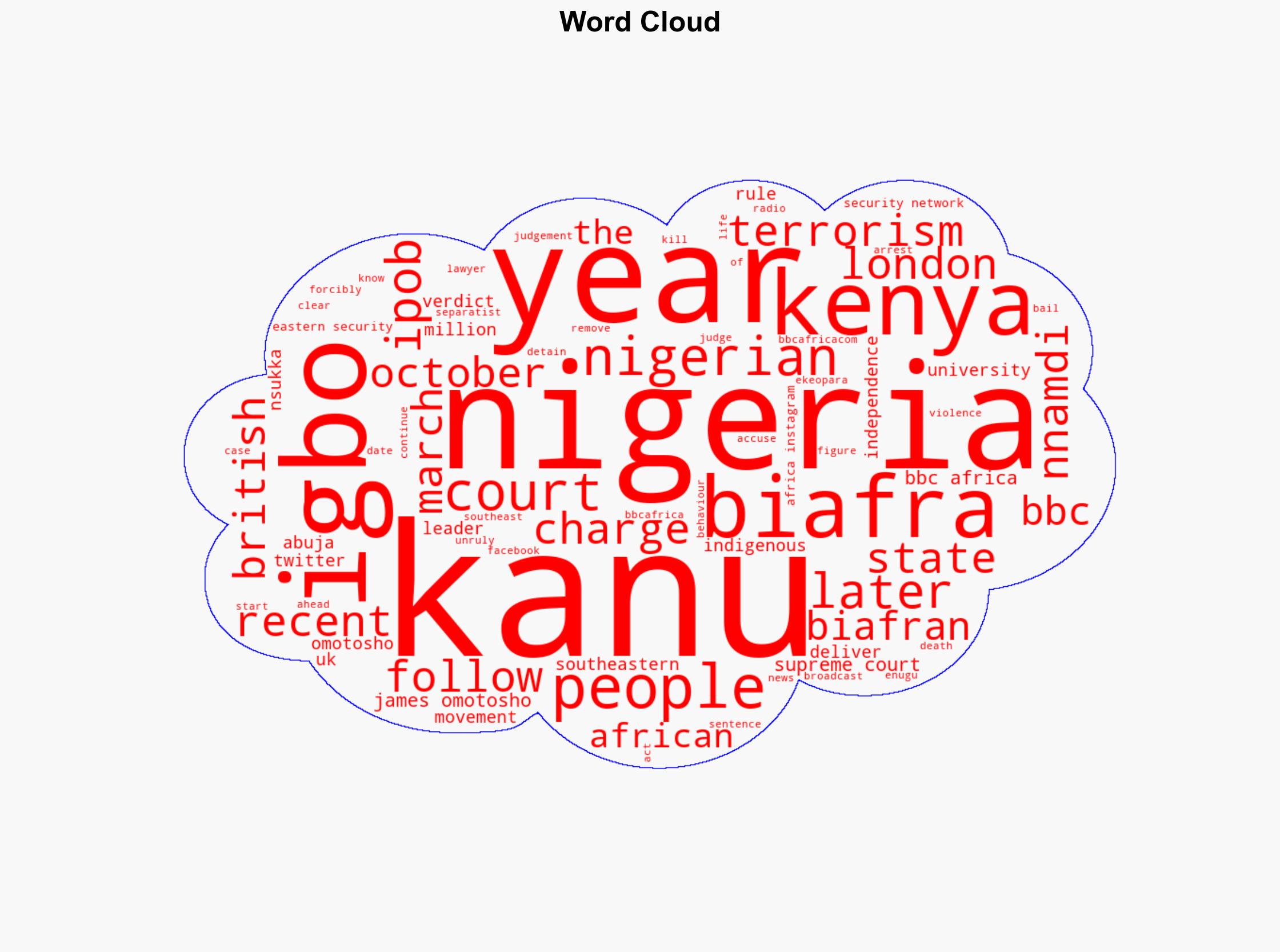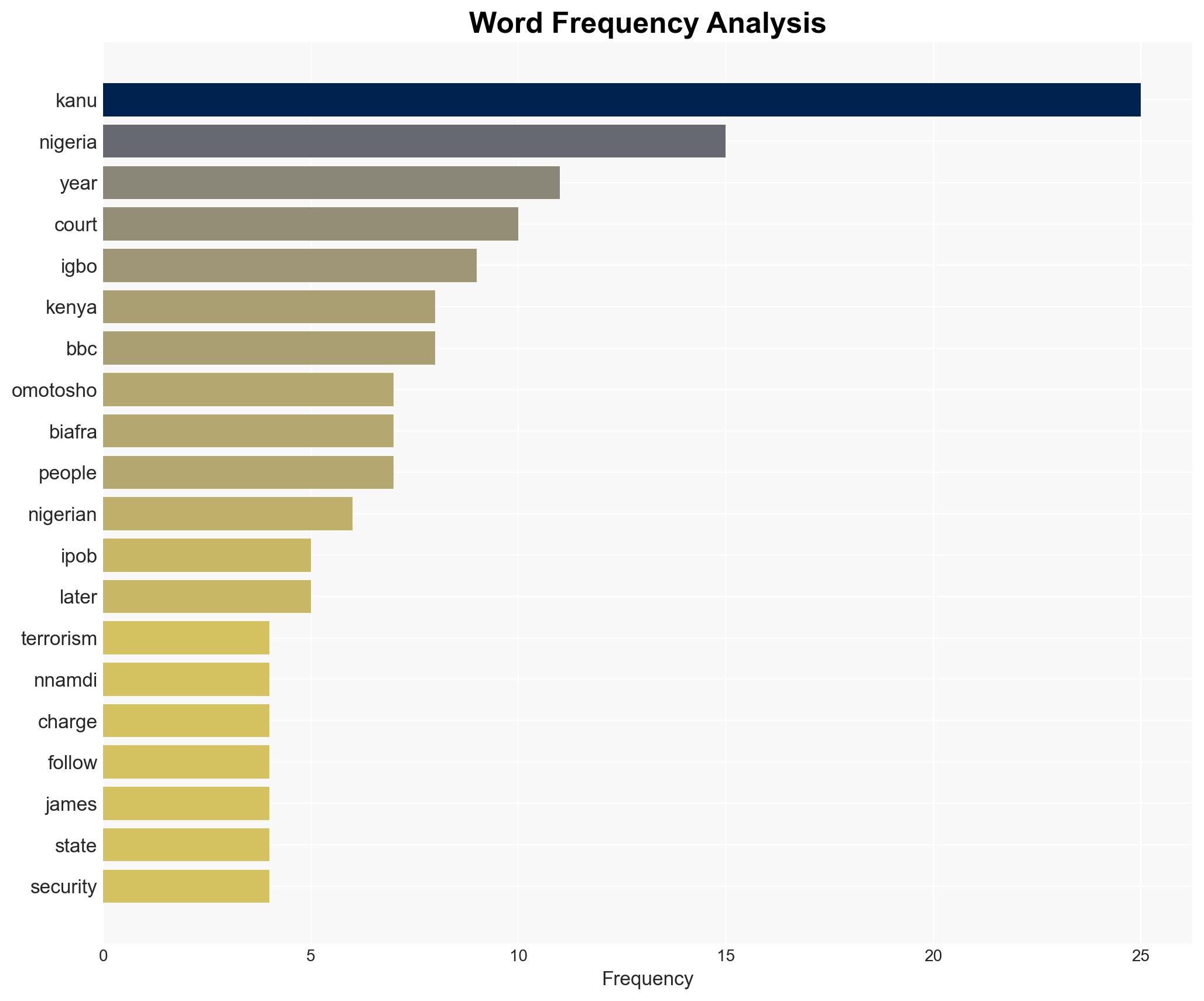Nigerian separatist leader convicted on terrorism charges – BBC News
Published on: 2025-11-20
AI-powered OSINT brief from verified open sources. Automated NLP signal extraction with human verification. See our Methodology and Why WorldWideWatchers.
Intelligence Report:
1. BLUF (Bottom Line Up Front)
The conviction of Nnamdi Kanu, a prominent Nigerian separatist leader, on terrorism charges is likely to exacerbate tensions in southeastern Nigeria, potentially leading to increased unrest and violence. The most supported hypothesis is that Kanu’s conviction will galvanize his supporters, leading to heightened separatist activities. Confidence Level: Moderate. Recommended action includes strengthening security measures in the region and engaging in dialogue with local leaders to address grievances.
2. Competing Hypotheses
Hypothesis 1: Kanu’s conviction will lead to increased separatist activities and violence in southeastern Nigeria as his supporters react to the perceived injustice.
Hypothesis 2: The conviction will weaken the separatist movement by removing its leader, leading to a decline in activities and eventual dissipation.
Hypothesis 1 is more likely due to Kanu’s significant influence and the historical context of the Biafran movement, which suggests deep-rooted grievances that are unlikely to dissipate quickly.
3. Key Assumptions and Red Flags
Assumptions include the belief that Kanu’s influence remains strong despite his incarceration and that the Nigerian government’s actions are perceived as legitimate by the international community. Red flags include potential bias in the judicial process and the risk of Kanu’s supporters resorting to violence. Deception indicators could involve misinformation campaigns by both the government and separatist groups to sway public opinion.
4. Implications and Strategic Risks
The conviction could lead to increased political instability in Nigeria, with potential spillover effects in neighboring regions. There is a risk of cyber-attacks targeting government infrastructure as a form of protest. Economic impacts may include disruptions in the southeastern region, affecting local businesses and international investments. Informational risks involve the spread of propaganda and misinformation, potentially inciting further unrest.
5. Recommendations and Outlook
- Enhance intelligence gathering and security presence in southeastern Nigeria to preempt and respond to potential unrest.
- Engage in dialogue with local leaders and community representatives to address underlying grievances and reduce tensions.
- Monitor online platforms for misinformation and coordinate with tech companies to mitigate its spread.
- Best-case scenario: Successful dialogue leads to reduced tensions and a peaceful resolution.
- Worst-case scenario: Escalation of violence and unrest, leading to a broader conflict.
- Most-likely scenario: Short-term unrest followed by a gradual return to the status quo, with ongoing low-level tensions.
6. Key Individuals and Entities
Nnamdi Kanu, James Omotosho, Indigenous People of Biafra (IPOB), Eastern Security Network.
7. Thematic Tags
Structured Analytic Techniques Applied
- Cognitive Bias Stress Test: Structured challenge to expose and correct biases.
- Bayesian Scenario Modeling: Use probabilistic forecasting for conflict trajectories or escalation likelihood.
- Network Influence Mapping: Map influence relationships to assess actor impact.
Explore more:
National Security Threats Briefs ·
Daily Summary ·
Support us





